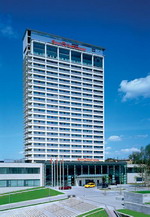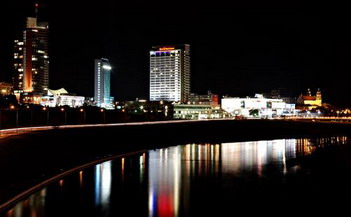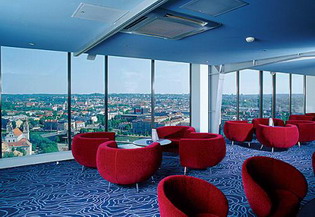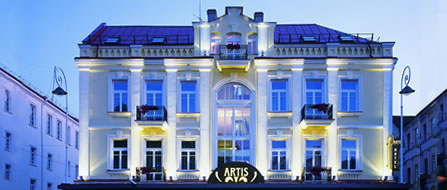 |
The welcome party will start on September, 20 at 19:30 in the SkyBar in the Reval Hotel. |



The conference will be held in the Conference center (Hall "Zeta") of the Reval Hotel Lietuva, located in the center of Vilnius.
Conference Dinner

The Conference Dinner will take place on September 22 in Artis Centrum Hotels, which is situated in the very centre of Vilnius old town in the renewed 19th century building (see map for location details).
Coming to Vilnius
It is possible to get to Vilnius by airplane or by rail train. Vilnius International Airport with 12 daily operating international airlines lies 7 km from the city center. It takes just 2 or 3 hours to get to Vilnius from most European cities. Reval Hotel Lietuva can be reached by bus No. 2 (takes about 30 minutes) which leaves Vilnius Airport every 10-15 minutes or by taxi (costs approximately 10 EUR)
The other possibility is to take a flight to Kaunas Airport, from which shuttle bus operates twice per day directly to Vilnius.
The Vilnius Railway Station is located in the center of the city, not far from the conference place (see map). Reval Hotel Lietuva can be reached by bus #43 or taxi.
The official currency of Lithuania is Lithuanian litas (LTL). 1 EUR = 3,45 LTL. However international credit cards are widely accepted.
About Vilnius
 Vilnius, the capital of Lithuania, was founded in 1323. Vilnius sits on the terraced banks of the Neris river surrounded by hills crowned by green pine forests. This natural setting is what gives the city its distinctive appeal. Vilnius has one of the largest in Eastern Europe historical Old Town representing all the European architectural styles. Because of its uniqueness, the Old Town was inscribed on the UNESCO World Heritage List.
Vilnius, the capital of Lithuania, was founded in 1323. Vilnius sits on the terraced banks of the Neris river surrounded by hills crowned by green pine forests. This natural setting is what gives the city its distinctive appeal. Vilnius has one of the largest in Eastern Europe historical Old Town representing all the European architectural styles. Because of its uniqueness, the Old Town was inscribed on the UNESCO World Heritage List.
With a current population of 576,400 Vilnius retains a snug, almost village-like feel, although it can hardly be described as a typical small town, being home to not just Lithuanians, but also a sizeable population of Russians, Poles, Jews and other nationalities. An ongoing cultural dialogue between the various nationalities is a clear priority for the city of Vilnius. In 2002 Vilnius was awarded UNESCO Cities For Peace Prize. It is perhaps this unique blend of cosmopolitan life and local feel that attracts more tourists and business travellers every year. Vilnius has been appreciated as an attractive place where one can enjoy architecture or social life, opera or basketball, shopping or street festivals, also friendliness of people, the comfort and hospitality.
In terms of architecture, Vilnius is a city of churches. There are about 40 churches of different architectural styles in the Old Town: at the same time Vilnius is the largest Baroque city, north of the Alps, and is often referred to as "Little Rome". The so-called "corner of blazing Gothic" – the Churches of St Bernardino and St Anne - attract the most visitors. As many as 33 different shapes of bricks have been used in the construction of the Church of St Anne. It is the subject of a  much-quoted remark, said to have been made by Napoleon, the famous French military leader, when his army occupied Vilnius in 1812, that he would like to be able to place it in the palm of his hand and take it back with him to Paris. The Cathedral, famous as a masterpiece of Classical architecture, dates back to the times of King Mindaugas. The style of architecture of the building changed with time – from a pagan temple to the main church of Lithuania. In 1985 a treasure was discovered in the wall of the Cathedral, which consisted of ecclesiastic cups, a monstrance, relics and other liturgical items. The treasure of Vilnius Cathedral is the most valuable collection of religious art, part of which can be seen at the exhibition "Christianity in Lithuanian Art".
much-quoted remark, said to have been made by Napoleon, the famous French military leader, when his army occupied Vilnius in 1812, that he would like to be able to place it in the palm of his hand and take it back with him to Paris. The Cathedral, famous as a masterpiece of Classical architecture, dates back to the times of King Mindaugas. The style of architecture of the building changed with time – from a pagan temple to the main church of Lithuania. In 1985 a treasure was discovered in the wall of the Cathedral, which consisted of ecclesiastic cups, a monstrance, relics and other liturgical items. The treasure of Vilnius Cathedral is the most valuable collection of religious art, part of which can be seen at the exhibition "Christianity in Lithuanian Art".
In the 16th century Vilnius became an important educational and cultural centre. Vilnius University established by the Jesuits is one of the oldest universities in Eastern Europe. The Old Town campus is arranged around thirteen courtyards, where you can, not only see impressive architectural elements, but also visit the Church of St John the Baptist and the Observatory.
Plenty of welcoming restaurants, cafes and pubs are tailored to satisfy even the most demanding taste. Here you will find different types of international cuisine and Lithuania's unique national dishes. Winding streets of the city led to the mansions of the nobility and landlords, churches, small shops and craftsmen shops.
Vilnius has a certain earthiness and welcomes its guests with exceptional attention. It is a delightful city of contrasts where wealthy historical heritage meets an expanding modernity. People of various nationalities and confessions peacefully coexist together. You will find Vilnius tolerant and safe.
The city of Vilnius has been announced as European Capital of Culture 2009.





 Vilnius, the capital of Lithuania, was founded in 1323. Vilnius sits on the terraced banks of the Neris river surrounded by hills crowned by green pine forests. This natural setting is what gives the city its distinctive appeal. Vilnius has one of the largest in Eastern Europe historical Old Town representing all the European architectural styles. Because of its uniqueness, the Old Town was inscribed on the UNESCO World Heritage List.
Vilnius, the capital of Lithuania, was founded in 1323. Vilnius sits on the terraced banks of the Neris river surrounded by hills crowned by green pine forests. This natural setting is what gives the city its distinctive appeal. Vilnius has one of the largest in Eastern Europe historical Old Town representing all the European architectural styles. Because of its uniqueness, the Old Town was inscribed on the UNESCO World Heritage List. much-quoted remark, said to have been made by Napoleon, the famous French military leader, when his army occupied Vilnius in 1812, that he would like to be able to place it in the palm of his hand and take it back with him to Paris. The Cathedral, famous as a masterpiece of Classical architecture, dates back to the times of King Mindaugas. The style of architecture of the building changed with time – from a pagan temple to the main church of Lithuania. In 1985 a treasure was discovered in the wall of the Cathedral, which consisted of ecclesiastic cups, a monstrance, relics and other liturgical items. The treasure of Vilnius Cathedral is the most valuable collection of religious art, part of which can be seen at the exhibition "Christianity in Lithuanian Art".
much-quoted remark, said to have been made by Napoleon, the famous French military leader, when his army occupied Vilnius in 1812, that he would like to be able to place it in the palm of his hand and take it back with him to Paris. The Cathedral, famous as a masterpiece of Classical architecture, dates back to the times of King Mindaugas. The style of architecture of the building changed with time – from a pagan temple to the main church of Lithuania. In 1985 a treasure was discovered in the wall of the Cathedral, which consisted of ecclesiastic cups, a monstrance, relics and other liturgical items. The treasure of Vilnius Cathedral is the most valuable collection of religious art, part of which can be seen at the exhibition "Christianity in Lithuanian Art".